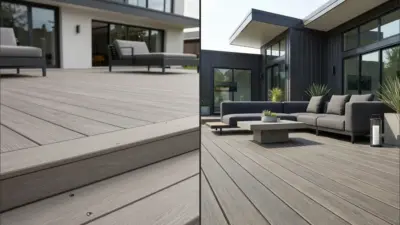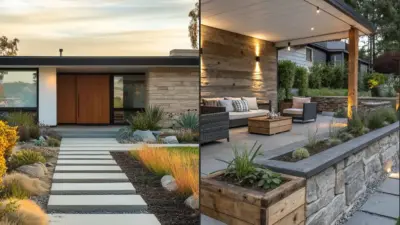

When it comes to choosing the best fencing material for your property, composite and vinyl fences are two of the most popular options. Both offer a range of benefits, from durability to low maintenance, but which one is better for your needs? Let’s break down the pros and cons of composite fencing and vinyl fencing, so you can make an informed decision about which is the right choice for your home.
Durability: Composite vs. Vinyl
Both composite and vinyl fencing are highly durable, but they differ in how they perform over time.
- Composite Fencing: Composite fencing is incredibly strong, able to withstand harsh weather conditions like heavy rain, intense sun, and freezing temperatures. It’s resistant to moisture and won’t rot, crack, or warp like wood. Over time, composite fencing will hold its shape and strength, even in areas that experience extreme temperatures.
- Vinyl Fencing: Vinyl fences are also resistant to the elements, particularly to moisture. Vinyl won’t rot, warp, or crack under pressure. However, it is more susceptible to damage from extreme temperatures. In very hot climates, vinyl can become brittle, and in cold weather, it may crack or become more prone to breaking. That said, it remains a sturdy option in moderate climates.
Winner: Composite fencing is better suited to extreme temperatures, making it the more durable choice overall. You can purchase it from www.dino.co.uk/category/composite-fencing/.
Maintenance: Composite vs. Vinyl
One of the major selling points for both composite and vinyl fences is their low maintenance requirements. However, they each have different needs.
- Composite Fencing: Composite fences require very little upkeep. They don’t need to be sanded, stained, or painted like wood, but they may need occasional cleaning to keep them looking their best. While they are highly resistant to the elements, composite fences can sometimes collect dirt or grime in high-traffic areas or in areas with a lot of moisture.
- Vinyl Fencing: Vinyl fences are almost maintenance-free. They don’t need any regular maintenance like wood or composite, and they won’t stain or discolour from the weather. However, vinyl may need to be cleaned occasionally with soap and water to prevent dirt build-up, and pressure washing can help remove tough stains.
Winner: Vinyl fencing is the easiest to maintain, requiring virtually no upkeep beyond the occasional clean.
Aesthetic Appeal: Composite vs. Vinyl
When it comes to aesthetics, both composite and vinyl fences offer a wide range of styles and colours. However, there are some differences.
- Composite Fencing: Composite fences have a natural wood appearance and often feature a more realistic look than vinyl. The wood fibres in composite materials give it texture and depth, making it a great option for those who want the beauty of wood without the maintenance. Additionally, composite fences come in a range of colours and can be customised to match your desired look.
- Vinyl Fencing: Vinyl fences offer a sleek, clean look, but they don’t have the natural appearance of wood. They’re typically available in white, though there are some other colours available, and you can also get them in different styles (e.g., picket, privacy, etc.). If you want a more modern, uniform look, vinyl can work well, but it may not have the warmth of composite fencing.
Winner: Composite fencing wins for aesthetics, especially for those who prefer a natural, wood-like appearance. Beyond the visual appeal and material properties, the longevity and functionality of any fence heavily rely on expert installation. A well-installed fence not only enhances your property’s curb appeal but also provides crucial security and privacy for years to come. Local conditions, such as soil type and weather patterns, significantly influence the best installation techniques and material choices. For residents in the Denver area, ensuring your fence is built to withstand specific regional challenges is paramount.
Engaging with a reputable service like Denver Fence Company can provide peace of mind, knowing your investment is handled by skilled professionals who understand the local landscape. While material choice matters, long-term performance often hinges on correct installation and site conditions. For many homeowners, working with a local installer clarifies which post systems, fastenings and finish options best suit their microclimate and boundary constraints.
While material choice matters, long-term performance often hinges on correct installation and site conditions. For many homeowners, working with a local installer clarifies which post systems, fastenings and finish options best suit their microclimate and boundary constraints.
A quick search for a Fencing Contractor Near Me can surface firms experienced with both composite and vinyl systems. Professional installers ensure proper post setting, drainage and sealing to prevent sagging or staining, and they can recommend the right maintenance routine. They can also help navigate planning rules and shared-boundary discussions so the finished fence both looks right and lasts.
Should I Ask My Neighbour to Chip in on a New Fence?
So, you want to get a new fence, and it’s on the boundary with your neighbour. This can become a tricky situation. Not only do you have to think about their light and make sure the style complements both properties, but you also have to consider the price. Should you ask your neighbour to chip in with the new fence since you’re both going to be benefitting from it? Let’s take a closer look at what you need to know.
Know what the Title Deeds Say
Always check your title deeds to see if there’s anything mentioned about the boundary. There could be conditions that state both neighbours have to pay and maintain the fence. In this case, you’re going to have to explain the situation to your neighbour, and this is when they can split the price with you.
Consider Previous Agreements
If you or your neighbour has lived in that house a long time, there might have been a previous agreement between the property about the shared fence. In other words, if the price is split before, you could use this agreement moving forward. Indeed, if they’re aware of this agreement, they shouldn’t have many objections.
Explain the Situation
Sometimes, you might need to convince your neighbour that you need a new fence and that they should contribute. For example, if it’s badly damaged and needs to be replaced, they need to be made aware of this. Indeed, it could impact them, as well as you. It can help if you compromise and make them part of the design process so they’re happy with the result.
Conclusion: Which is the Better Option?
Both composite and vinyl fencing offer excellent durability and low-maintenance benefits, but the right choice for you depends on your priorities:
- Choose composite fencing if you want a fence that looks like wood, offers excellent durability in all weather conditions, and is more environmentally friendly.
- Choose vinyl fencing if you’re looking for an affordable, low-maintenance option that offers a sleek, modern look and is easier to maintain over time.
Ultimately, it comes down to your personal preferences and needs. Either way, both options provide a long-lasting solution for your fencing needs, so you can’t go wrong!
- 4shares
- Facebook0
- Pinterest1
- Twitter3
- Reddit0



